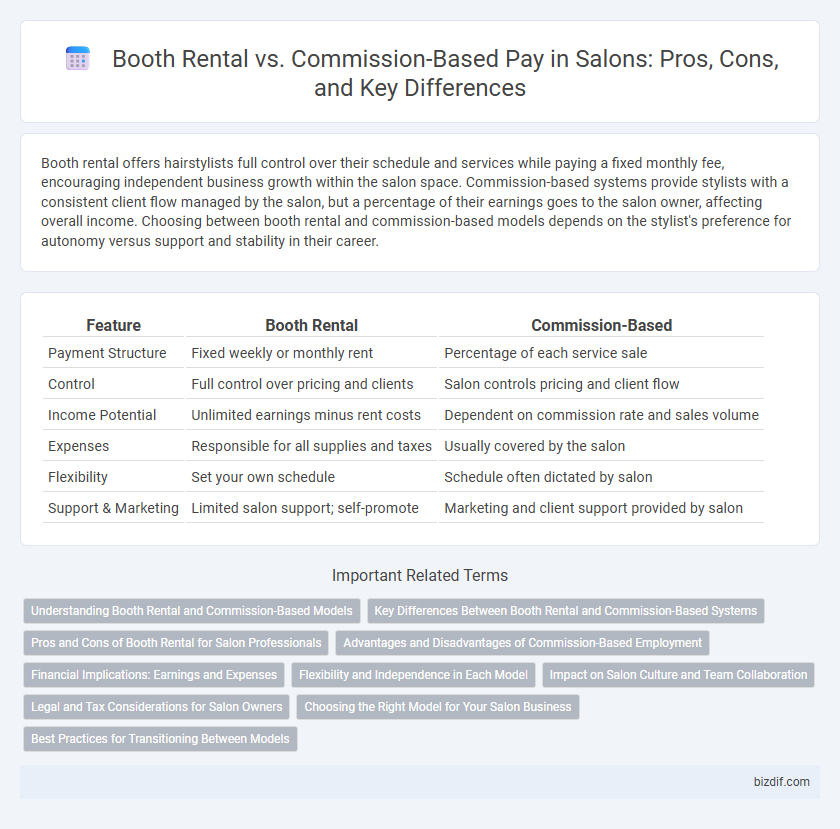Booth rental offers hairstylists full control over their schedule and services while paying a fixed monthly fee, encouraging independent business growth within the salon space. Commission-based systems provide stylists with a consistent client flow managed by the salon, but a percentage of their earnings goes to the salon owner, affecting overall income. Choosing between booth rental and commission-based models depends on the stylist's preference for autonomy versus support and stability in their career.
Table of Comparison
| Feature | Booth Rental | Commission-Based |
|---|---|---|
| Payment Structure | Fixed weekly or monthly rent | Percentage of each service sale |
| Control | Full control over pricing and clients | Salon controls pricing and client flow |
| Income Potential | Unlimited earnings minus rent costs | Dependent on commission rate and sales volume |
| Expenses | Responsible for all supplies and taxes | Usually covered by the salon |
| Flexibility | Set your own schedule | Schedule often dictated by salon |
| Support & Marketing | Limited salon support; self-promote | Marketing and client support provided by salon |
Understanding Booth Rental and Commission-Based Models
Booth rental in salons offers stylists a fixed rental fee for their own workspace, providing control over their schedule and income but requiring management of supplies and client acquisition. Commission-based models pay stylists a percentage of the services they perform, with salons typically handling marketing, product sales, and operational expenses. Understanding these models helps stylists choose the best fit for their financial goals and professional independence.
Key Differences Between Booth Rental and Commission-Based Systems
Booth rental in salons involves stylists leasing their own space and operating as independent contractors, allowing full control over schedules and service pricing while handling their own supplies and taxes. Commission-based systems pay stylists a percentage of the revenue from services performed, providing them with salon-managed supplies and client bookings but less autonomy over income and work hours. Key differences include financial risk, level of independence, and responsibility for client acquisition and business expenses.
Pros and Cons of Booth Rental for Salon Professionals
Booth rental offers salon professionals independence, allowing full control over their schedule, services, and client base while retaining 100% of their earnings. However, renters bear all business expenses, including product supplies, marketing, and taxes, which can affect profitability. The lack of salon-provided support and potential isolation present challenges compared to commission-based models with shared resources and clientele.
Advantages and Disadvantages of Commission-Based Employment
Commission-based employment in salons offers hairstylists the advantage of earning income proportional to their service sales, incentivizing high performance and client retention. However, this model can lead to income volatility and pressure to upsell services, potentially impacting job satisfaction and work-life balance. Salons benefit by aligning stylist compensation with business revenue, but must carefully manage fair commission rates to maintain a motivated and stable workforce.
Financial Implications: Earnings and Expenses
Booth rental offers stylists a fixed monthly expense, allowing them to retain 100% of their earnings but requires covering their own product costs, taxes, and marketing. Commission-based models reduce upfront expenses by taking a percentage of stylist income, but stylists typically earn less per service and have limited control over scheduling. Evaluating personal cash flow, financial risk tolerance, and revenue goals is essential when choosing between steady overhead versus variable income with shared expenses.
Flexibility and Independence in Each Model
Booth rental offers hairstylists maximum flexibility and independence, allowing them to set their own hours, prices, and services while keeping 100% of their earnings. Commission-based models provide less autonomy but include financial support, client base, and salon resources, often requiring stylists to adhere to fixed schedules and share a percentage of their income with the salon. Choosing between booth rental and commission-based arrangements depends on a stylist's preference for control versus support within a salon environment.
Impact on Salon Culture and Team Collaboration
Booth rental fosters a more independent work environment where stylists operate as individual entrepreneurs, which can reduce team collaboration and weaken salon culture. Commission-based models encourage stylists to work collectively, aligning incentives and promoting a supportive atmosphere that enhances overall team morale. Salons with commission structures often experience stronger community bonds and more cohesive client service experiences.
Legal and Tax Considerations for Salon Owners
Salon owners must navigate distinct legal and tax implications when choosing between booth rental and commission-based models. Booth rental agreements often classify renters as independent contractors, shifting tax liabilities and reducing payroll obligations for the salon, while commission-based stylists are typically employees, necessitating payroll taxes, workers' compensation, and compliance with labor laws. Proper documentation and clear contracts are essential to avoid misclassification risks, audits, and potential legal penalties in either arrangement.
Choosing the Right Model for Your Salon Business
Booth rental offers salon professionals independence and fixed monthly expenses, ideal for experienced stylists seeking control over their earnings. Commission-based models align salon income with stylist performance, promoting motivation but resulting in variable revenue for both parties. Selecting the right model depends on salon goals, financial stability, and desired partnership dynamics to optimize profitability and professional satisfaction.
Best Practices for Transitioning Between Models
Salon owners transitioning from commission-based to booth rental models should clearly communicate contract terms and expectations to ensure transparency. Implementing a phased transition with support resources helps stylists adapt financially and professionally. Regular feedback and performance evaluations during the transition foster trust and optimize operational success.
Booth Rental vs Commission-Based Infographic

 bizdif.com
bizdif.com